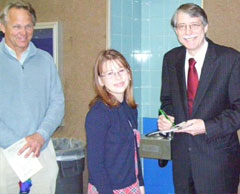All-Spanish Program, New York City
Orange blossoms and almond trees appeared in the first few measures and evanesced with the final notes and warm applause….
NEW YORK CONCERT REVIEW
(All-Spanish Program)
Dan Franklin Smith, piano
Christ and St. Stephen’s Church
January 13, 2002
Dan Franklin Smith’s reputation as an artist with insatiable interest in ferreting out unusual repertory precedes him. Presented in recital by Musica de Camara (Dir. Eva de la O), Smith not only lived up to such notion, but offered a bounty of beautiful music, beautifully played. He does not wallow in curiosities like some eccentric maladept who fails at more standard fare; rather, he brings great thought and musical gift, and industry, to the concept of widening his own, and our, musical horizons.
Beginning with a selection of four Sonatas by Padre Antonio Soler, Smith brought a personal approach to each. Especially beguiling was the first in F# Major, usually played (when played at all) in brilliant display but here given gentle caress. It spoke so well and was such a surprise that I was drawn in to Smith’s world, confident of further revelation. I was not disappointed.
When was the last time you heard Turina’s Sonata Sanlucar de Barrameda? This sumptuous score of four movements is of substantial and colorful invention. It cries out for consideration by all pianists weary of the glass and steel of Barber and Prokofieff. Smith’s management of this opulent creation was clear in counterpoint and harmonic massing. Orange blossoms and almond trees appeared in the first few measures and evanesced with the final notes and warm applause of the appreciative audience.
Busoni’s Sonatina Seconda opened the program’s second half. This is music that would not seem to shout its news from the printed score. Pianists can be a lazy bunch; too much “black” on the page, and they continue leafing through. Not Mr. Smith. He’s worked this piece through and presented it with as much care as most pianists would render a Bach Partita. I’m not so ready to tip my hat to it; unfamiliar to me, the music struck me as somewhat “mad genius” in its manner. Clearly of great craft, the score does seem to follow the general trend of Busoni’s ambiguous nationalism: Am I Italian? Am I German? I am certainly Serious!
The audience belatedly learned of the Busoni’s conclusion by way of hearing the unmistakable sounds of Rachmaninoff’s Preludes, Nos.8 and 9 from Op.32 and Nos.5 and 6 from Op.23. These were all played well enough although I was impatient to get on with the show i.e. the more obscure fare. Such is the danger Mr. Smith confronts by being the maverick!
Tus Ojos (Danza) by Jose Ignacio Quinton (1885 1925) was a lovely salon piece, stylishly played and really a charmer. In this, as throughout the whole program, Smith did not wear heart on sleeve. His manner of music making does not embrace glitz or showy plumage. It is as though he has a secret within; the astute listener will sense this and move toward him by degree. A feeling of intimacy and sincerity flourishes. Without Smith’s musical/pianistic gift, it would all add up to a lot of nothing, a bore. He wears his passion unobtrusively yet not without some flair; his hands speak eloquently in the way he uses them. The somewhat grim demeanor is misleading. As Freud put it, “…confession oozes from every pore.” Indeed, Mr. Smith likewise emits music. He also manages a smile now and then.
The program ended with Hector Campos Parsi’s Plena No.1 (Santa Maria) written in 1955. Campos Parsi’s whole musical output is so varied and of such high quality. This particular work finds the French trained composer (1914 1998, Puerto Rican) in decidedly Latino mode with the added fillip of some jazz driven interludes. Mr. Smith hunkered down for a celebratory performance that made a great case for this piece.
Should anyone have wondered if Mr. Smith ever indulged in the commonplace, he tossed off one of Chopin’s quirkier Mazurkas in E and a Beethoven Bagatelle in C from Op.33. Apparently, he plays everything.
—Darrell Rosenbluth, New York Concert Review, Christ and St. Stephen’s Church, New York City

